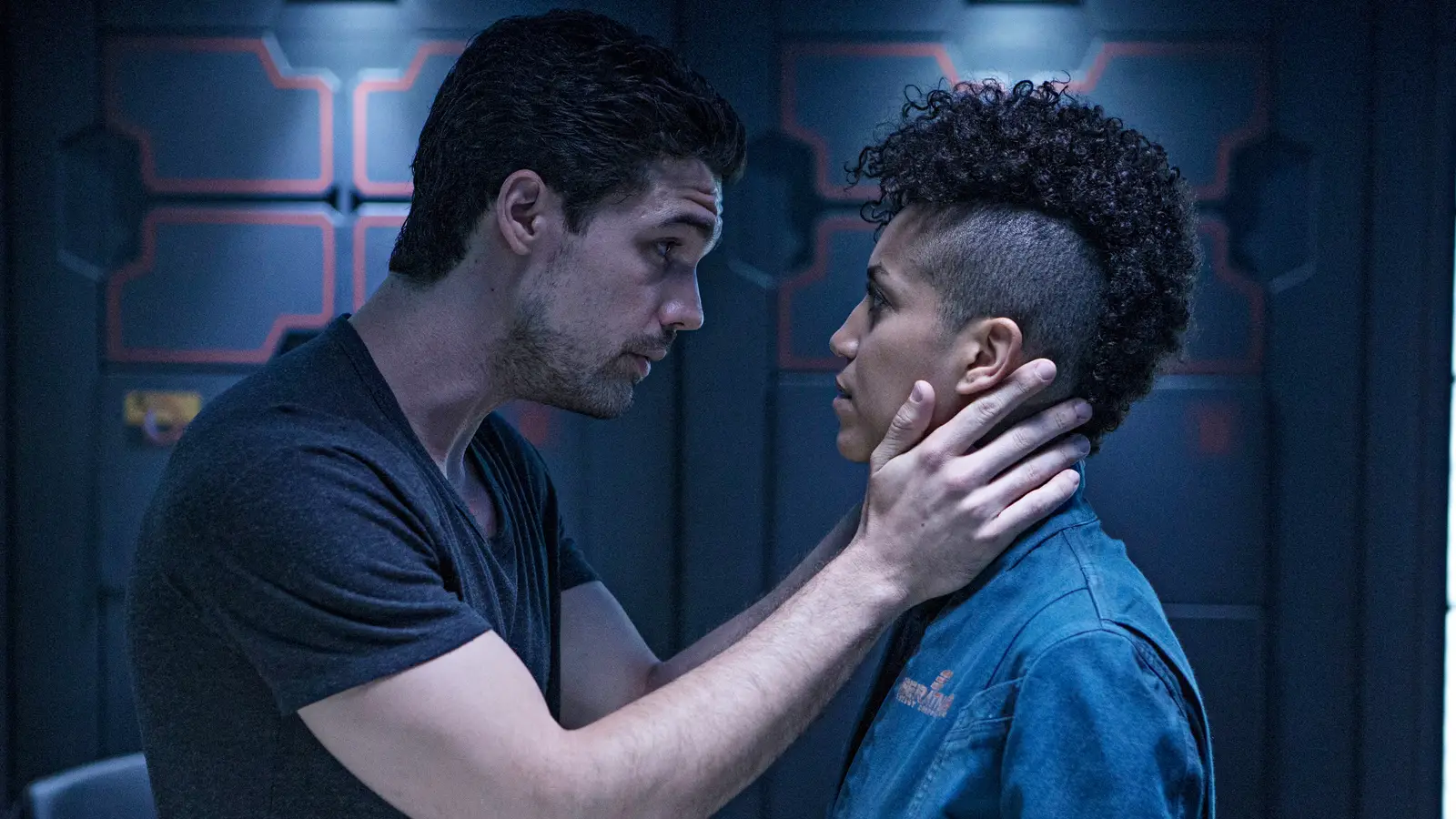
The Expanse has only grown in stature since its conclusion in 2022. Widely celebrated as one of the greatest sci-fi shows not just of the century but of all time, its reputation continues to expand beyond its loyal fanbase. Despite this acclaim, many sci-fi enthusiasts have yet to experience the Rocinante crew’s extraordinary journey across a colonized solar system.
That hesitation is somewhat understandable. Every few years, a new sci-fi series arrives that’s hailed as essential viewing, only to fade into obscurity once the hype dies down. However, The Expanse isn’t one of those. It endures because it has everything great science fiction should: dazzling visuals, fascinating worldbuilding, political intrigue, and provocative ideas about humanity’s place in the universe.
While the series is best experienced chronologically, certain episodes of The Expanse distill its brilliance into unforgettable sci-fi moments. For those still unconvinced, these entries showcase the best of what The Expanse has to offer, serving as perfect entry points into its gripping, thought-provoking, and uniquely ambitious brand of sci-fi.
Dulcinea (Season 1, Episode 1)
A Pilot That Redefines How To Introduce A Sci-Fi World
“Dulcinea” wastes no time in making its mark. As the pilot, it pulls viewers into The Expanse’s sprawling vision of humanity spread across the stars. From the icy void of space to the tense politics of Earth, Mars, and the Belt, it sketches out a universe brimming with both possibility and conflict. Few pilots manage such deft worldbuilding.
The episode introduces James Holden (Steven Strait), Naomi Nagata (Dominique Tipper), Amos Burton (Wes Chatham), and Alex Kamal (Cas Anvar), while also plunging into the mystery of Julie Mao (Florence Faivre). However, instead of overwhelming exposition, “Dulcinea” lets its world breathe through visuals, atmosphere, and subtle cultural cues.
For sci-fi fans, the thrill lies in its combination of realism and imagination. Like Battlestar Galactica’s “33,” this pilot proves The Expanse provides gripping science-fiction from the start. It doesn’t just introduce a setting – it immerses you in a lived-in future that feels both alien and disturbingly plausible.
Cascade (Season 2, Episode 10)
A Reminder Of How Culture Shapes Humanity In Space
What makes “Cascade” so powerful isn’t just its intrigue but its thematic weight. The Expanse consistently emphasizes that humans don’t simply adapt to space – they evolve into new cultures, new identities. Nowhere is this clearer than when Bobbie Draper (Frankie Adams) sees Earth’s ocean for the first time.
The moment is breathtaking because it highlights the sheer scale of difference between Earth-born, Martians, and Belters. A simple wave on a shoreline becomes an existential revelation for Bobbie. This is science fiction at its most poignant: using imagined futures to reflect on what we take for granted today.
The episode also excels in political complexity. As the factions maneuver, the show underscores that humanity’s divisions are just as vast as the physical distances separating them. It’s the type of thoughtful worldbuilding that sci-fi fans hungry for depth – more Star Trek than space opera
spectacle – will instantly connect with.
It Reaches Out (Season 3, Episode 8)
When Sci-Fi Veers Into The Realm Of Psychological Horror
“It Reaches Out” takes The Expanse into darker territory. James Holden finds himself haunted by a phantom version of Detective Miller (Thomas Jane), an unnerving side effect of his exposure to the Protomolecule. The result is an episode steeped in tension, where reality and hallucination blur in unsettling ways.
This shift into psychological sci-fi echoes multiple classic sci-fi movies that see technology and alien contact force the human mind into disarray. Holden’s experiences create unease not just for him but for the crew around him, as his grip on sanity seems to slip.
For sci-fi fans, “It Reaches Out” demonstrates the show’s versatility. It isn’t confined to battles or politics; it can pivot into near-horror while staying firmly grounded in science fiction. That balance of psychological dread and speculative science is what makes this episode so memorable in The Expanse’s run.
Doors & Corners (Season 2, Episode 2)
Sci-Fi Action At Its Sharpest And Most Tactical
While The Expanse thrives on philosophy and politics, season 2’s “Doors & Corners” is proof that it can deliver adrenaline-pumping action just as well. The Rocinante crew, alongside Fred Johnson (Chad Coleman), launches a daring raid to seize critical Protomolecule data, and the result is a meticulously staged assault that feels as raw as it is exhilarating.
Unlike the flashy, consequence-free firefights of typical space operas, this sequence is brutal and tactical. Every decision matters, every bullet counts, and the human cost is never ignored. It’s action rooted in realism, which makes it all the more gripping.
The episode shows how The Expanse can balance spectacle with grounded stakes. Fans who admire the hard-edged combat of Aliens or the tension-filled skirmishes of Battlestar Galactica will find this raid unforgettable. It’s The Expanse at its most militaristic, proving the show’s range without ever sacrificing its intelligence.
CQB (Season 1, Episode 4)
A Space Battle That Cemented The Expanse As Must-Watch Sci-Fi
“CQB” is often hailed as the episode that signaled The Expanse’s staying power. When the Rocinante (then still the Canterbury survivors) comes under attack in a claustrophobic skirmish, the show delivers its first jaw-dropping space battle. The choreography, physics, and visual scale raised the bar for television sci-fi in 2015.
The sequence works because it respects real-world spaceflight mechanics. There’s no sound in the void, no gravity unless induced, and the violence is sudden, catastrophic, and irreversible. For fans of hard science fiction, this wasn’t just entertainment – it was validation that TV could treat space with respect.
Beyond the spectacle, the episode humanizes the conflict. Amos and Naomi are tested under fire, while Holden proves himself as a reluctant leader. “CQB” is where The Expanse first showed it could marry nail-biting tension with character development, making it a cornerstone of the series.
Home (Season 2, Episode 5)
When Philosophy And Spectacle Collide In Stunning Sci-Fi Fashion
“Home” blends action with deep philosophical weight, making it one of The Expanse’s standout episodes. The crew of the Rocinante races to intercept an asteroid infected with the Protomolecule, and Detective Miller confronts Julie Mao in a haunting climax that resonates far beyond the immediate story.
This episode encapsulates why The Expanse works so well: it’s never just about the chase or the fight. Miller’s arc becomes a meditation on love, sacrifice, and what it means to face forces far larger than humanity can comprehend. It’s epic storytelling disguised as intimate tragedy.
From a sci-fi perspective, “Home” excels because it treats alien technology as both awe-inspiring and terrifying. Like the monoliths in 2001: A Space Odyssey, the Protomolecule inspires existential dread while forcing humans to confront their own fragility. For fans, this is The Expanse at its most profound.
Saeculum (Season 4, Episode 9)
A Psychedelic Dive Into The Mysteries Of Consciousness
By season 4, The Expanse was unafraid to push the boundaries of traditional sci-fi, and “Saeculum” proves it. James Holden finds himself caught in direct communion with the alien Protomolecule, leading to a sequence of psychedelic visuals and head-spinning discussions about consciousness and survival.
This isn’t action-heavy storytelling. Instead, it leans into the cerebral side of science fiction. The imagery borders on surreal, inviting comparisons to Annihilation or, just like season 2’s “Home”, 2001: A Space Odyssey. It’s rare for a show to risk going so abstract, but The Expanse turns it into a highlight.
“Saeculum” shows the series’ ambition – its willingness to step outside familiar territory and explore the unknown. For fans who crave sci-fi that doesn’t just entertain but also challenges perception, this episode feels like a perfect encapsulation of The Expanse’s intellectual boldness.
Nemesis Games (Season 5, Episode 10)
Galactic Politics Pushed To Their Most Devastating Conclusion
Few episodes display the devastating consequences of political conflict like “Nemesis Games.” With Marco Inaros (Keon Alexander) unleashing chaos across the solar system, the fragile balance between Earth, Mars, and the Belt collapses entirely. The Expanse’s grand political threads come together here with ruthless clarity.
This is space opera at its sharpest: not just spaceships and battles, but the shattering of civilizations under ideological extremism. The ripple effects extend far beyond the personal stakes of the Rocinante crew, cementing the idea that The Expanse is a true epic.
Fans of sprawling political sci-fi like Dune or Foundation will find this finale particularly rewarding. “Nemesis Games” proves that The Expanse isn’t only about individuals – it’s about systems, ideologies, and the galaxy-sized consequences of humanity’s divisions. It’s the show at its most expansive and devastating.
Leviathan Wakes (Season 1, Episode 10)
A Chilling Showcase Of The Protomolecule’s True Potential
As The Expanse season 1’s finale, “Leviathan Wakes” pulls back the curtain on the terrifying potential of the Protomolecule. What begins as intrigue evolves into outright horror, with visuals and concepts that feel straight out of the best sci-fi thrillers. The episode firmly establishes the alien substance as one of television’s most unsettling creations.
The horror is underscored by science. The Protomolecule is as much a biological enigma as it is a technological one, its behavior terrifyingly plausible within the framework of speculative science. For fans who enjoy the grounded terror of The Thing or Alien, this episode delivers in spades.
“Leviathan Wakes” also cements The Expanse as more than just a space-based political drama – it’s a series that can shift into existential terror when needed. It’s a finale that promises the story ahead will only get stranger, scarier, and more ambitious.
Gaugamela (Season 5, Episode 4)
A Sci-Fi Spectacle With The Scope Of A Blockbuster Film
Of all 62 episodes of the series, it’s “Gaugamela” which captures everything that makes The Expanse one of the greatest sci-fi shows ever made. Marco Inaros (Keon Alexander) launches a devastating stealth asteroid attack on Earth, an act of destruction that combines political ruthlessness with cinematic spectacle.
The sheer scale of devastation makes it feel like a disaster movie in space, but what elevates it is the meticulous detail. The physics of the stealth asteroids, the political fallout, and the personal reactions all intertwine to make the attack horrifyingly believable.



